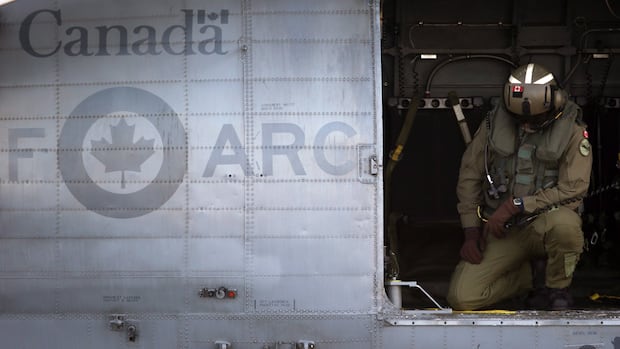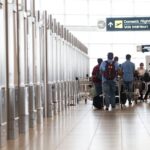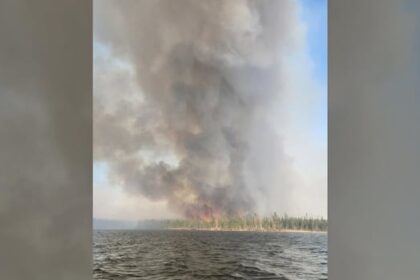PoliticsThe Royal Canadian Air Force is defending its pilot bonus pay system after an internal review criticized it as poorly thought out. Pilots are also not happy, filing dozens of grievances. The experience-based system, which mimics commercial airlines’ pay scales, has meant some captains are turning down promotions because it’ll cost them money. New experience-based pay rate for military pilots was poorly thought out: internal defence reportMurray Brewster · CBC News · Posted: Oct 21, 2025 4:00 AM EDT | Last Updated: 5 hours agoThe Royal Canadian Air Force is defending its pilot bonus pay system after an internal review criticized it as poorly thought out. (Chad Hipolito/The Canadian Press)A new experience-based pay rate for military pilots — intended to keep them in uniform rather than flying for commercial airlines — was poorly thought out, badly implemented and has resulted in some officers refusing promotions because it would set them back financially, says an internal Defence Department report obtained by CBC News.The changes were conceived five years ago by air force brass and came into effect in the spring of 2021. They were made in response to a 2018 report by the auditor general that identified critical shortages of trained pilots and technicians that were preventing the Royal Canadian Air Force from meeting NORAD and NATO operational commitments. The new pay system, which mimics the graduated civilian system of increasing pay for each year of flying experience, whether or not a person gets promoted in rank, has resulted in 85 internal grievances from pilots who consider it unfair and career-limiting.“The aim of the pilot pay restructure was to improve pilot retention by better aligning pilot pay with the commercial airline industry,” said an internal evaluation of retention efforts across the entire military, dated April 2025.Pilot retention key for new F-35 fleetThe issue of pilot retention is critical because the auditor general, in a more recent report last June, noted that there won’t be enough trained fighter pilots when the new F-35 fleet arrives.“Our last audit of the CF-35 in 2018, we found that the shortage of qualified pilots was one of the biggest challenges facing national defence,” Auditor Karen Hogan told a House of Commons committee last week. “This is still true six years later.”The new system compensates pilots based on their qualifications and experience and is intended to provide “strong incentives for skill acquisition and longevity of service,” the Department of National Defence said in a recent statement.“It allows pilots who wish to remain in a flying role to be compensated for their expertise on an extended captain’s pay scale, with viable increases over a longer period,” the Defence Department said in answer to a query from CBC News.A pilot positions a CF-18 Hornet at CFB Cold Lake in Alberta. Retention, says former air force major-general Charles ‘Duff’ Sullivan, is about more than money. It also includes ensuring pilots have a good quality of life in remote postings such as Cold Lake. (Jason Franson/The Canadian Press)In the commercial sector, experienced, high-skilled pilots can earn as much as $350,000 per year with top airlines, which is more than the country’s top military commander.The new pilot pay system, however, has had unexpected, unintended consequences, according to the internal report.“The new pay scale initially resulted in some captain pilots earning eight per cent more, which subsequently resulted in an overall increase in compensation for all pilots,” said the report. “The potential for a captain to make more than a major results in some pilots refusing promotions.”That, in turn, led to “a cluster of grievances” from pilots.“Many of these grievances are still ongoing,” the report noted.Implementation ‘vague,’ poorly documented: reportThe report suggested the air force implemented the new system without much research or consideration of alternatives and contrary to the experience of other allied nations, which are struggling with the same retention issues. “There is no evidence to support that an increase in compensation would alleviate the issue identified in the OAG report, nor that the scope of the compensation needed to expand beyond fighter pilots,” said the report.“The decision to implement the pay restructure deviated from best practices of allied armed forces (U.S., Australia, U.K.) and was without a well-defined methodology. The absence of a justified and well-documented process led to execution challenges, including minimal documentation.”The report complained that the submission to the federal Treasury Board to obtain funding for the new incentives was “vague” and that there was no formal implementation plan.According to documents tabled before Parliament, as of June 16, 2025, the RCAF’s front line fighter squadrons had a staffing rate of 66 per cent. The overall rate of pilot staff across the entire air force is 90 per cent, the Defence Department said in a statement.Defence Minister David McGuinty, in a written response last month to questions tabled in the Commons, praised the new pay structure as essential to recruitment efforts.“National Defence recently finished implementing a revised pilot pay scale to support retention efforts,” McGuinty said in his written response. “The pay scale compensates pilots based on their experience and qualifications through the introduction of a new skills- and competencies-oriented pay system.” McGuinty also said the RCAF “continues to engage with our allies to share information on how to mitigate this common challenge.”Appearing before a Commons committee last week, the new commander of the air force, Lt.-Gen. Jamie Speiser-Blanchet, also praised the pay incentive system as good for recruiting.“We have been able to re-attract some pilots who had retired back to the RCAF,” Speiser-Blanchet testified before the public accounts committee. “Some of that was due to an increase in pilot pay specifically, which took place before the most recent increase in pay to all military members this past summer.”Two F-35 Lightning fighter aircraft participate in a flypast celebrating the RCAF centennial on Canada Day 2024. Pay increases have attracted some pilots back to the RCAF, says the new commander of the air force, Lt.-Gen. Jamie Speiser-Blanchet. (Justin Tang/The Canadian Press)’It doesn’t make any sense’: ex-air force general Former air force major-general Charles “Duff” Sullivan, who reviewed a copy of the internal report obtained by CBC News, said he’s not surprised by the findings.“Whenever senior leaders are faced with issues to deal with, you know, attrition and retention, for some reason, they always come in first and say, well, let’s pay everybody more money,” Sullivan said in an interview.“Having a junior officer getting paid more than a senior officer on the exact same unit doing the exact thing, I mean, it doesn’t make any sense. And that just underscores or shines a bright light on the lack of thought.”In Canada, a senior commercial pilot for a major Canadian airline can earn anywhere from $100,000 to over $300,000 annually, with widebody captains who have extensive experience potentially earning over $350,000 per year plus expenses.“To simply say that we’re gonna pay our military pilots the same as a commercial airline pilot is not really realistic,” Sullivan said.Retention, especially in the fighter pilot world, is not just about money, says Sullivan, who says issues such as quality of life in remote postings, such as the airbases in Cold Lake, Alta., and Bagotville, Que. mean more than cash. Last summer, the prime minister announced a sweeping pay increase for the entire military, but in its statement, the Defence Department says that is separate from the pilot bonus system.ABOUT THE AUTHORMurray Brewster is senior defence writer for CBC News, based in Ottawa. He has covered the Canadian military and foreign policy from Parliament Hill for over a decade. Among other assignments, he spent a total of 15 months on the ground covering the Afghan war for The Canadian Press. Prior to that, he covered defence issues and politics for CP in Nova Scotia for 11 years and was bureau chief for Standard Broadcast News in Ottawa.Follow Murray Brewster on Twitter
Wednesday, 4 Feb 2026
Canada – The Illusion
Search
Have an existing account?
Sign In
© 2022 Foxiz News Network. Ruby Design Company. All Rights Reserved.
You May also Like
- More News:
- history
- Standing Bear Network
- John Gonzalez
- ᐊᔭᐦᑊ ayahp — It happened
- Creation
- Beneath the Water
- Olympic gold medal
- Jim Thorpe
- type O blood
- the bringer of life
- Raven
- Wás’agi
- NoiseCat
- 'Sugarcane'
- The rivers still sing
- ᑲᓂᐸᐏᐟ ᒪᐢᑿ
- ᐅᑳᐤ okâw — We remember
- ᐊᓂᓈᐯᐃᐧᐣ aninâpêwin — Truth
- This is what it means to be human.
- Nokoma











